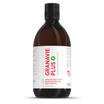Does everyday life place so high demands on you that you barely have time to breathe? If fatigue, stress , and the feeling of just functioning are part of your daily routine, then you should read on. There are plants that can help your body adapt better to the demands of everyday life . These so-called adaptogens have been known for centuries and support your body in finding inner balance and strengthening its resilience .
The most important things in brief
Adaptogens are natural plant substances that help the body adapt better to stress and strain
Among the best-known adaptogens are Ashwagandha, Saffron, Ginseng and Rhodiola Rosea , which are known for their stress-regulating and strengthening properties
Adaptogens have been used traditionally for centuries to support general well-being . Their diverse positive effects on the body are now being investigated in numerous scientific studies .
What are adaptogens?
Adaptogens are natural plant substances that make the body more resilient to physical and psychological stress . They help it adapt better to stress without increasing oxygen consumption. The term "adaptogen" comes from Latin and means " to adapt, " and that is precisely their function: They promote resilience and support inner balance by stabilizing the body's natural regulatory processes.
The use of adaptogens has a long history in traditional medicine and is now being increasingly researched scientifically. Numerous studies now confirm their positive effects.
These natural substances make adaptogens so powerful
Adaptogens are something very special : Their power is based on the perfect interplay of various bioactive substances . It is this unique combination that makes them so beneficial for the body. But which ingredients are truly behind their effects?

The key compounds that make adaptogens so powerful:
-
Triterpenoid saponins and ecdysterone : plant defense substances for protection against predators and pathogens.
Phytosterols: Stabilize plant cell membranes and support the production of plant hormones.
Lignans: Protect plants from harmful microorganisms and UV radiation.
Alkaloids, flavonoids, vitamins and other bioactive substances: Support plant defense against pests, regulate plant growth and provide antioxidant and UV protection (1) .
Don't worry, you don't have to memorize all of these ingredients. What's more important is which plants they contain and how they support your body. While all adaptogens help create more balance, they have different properties . Each plant is unique and supports the body in different ways. Below, we'll introduce you to the most well-known adaptogens and show you what makes them so special.
Ashwagandha as an effective adaptogen
Insulin resistance is often caused by a diet high in sugar and foods with a high glycemic index, as these permanently increase insulin levels. At the same time , obesity, lack of exercise, and genetic factors, such as family history or conditions like PCOS , can increase the risk. Low levels of omega-3 fatty acids and fiber, as well as high levels of fructose and unhealthy fats in the diet, also promote the development of insulin resistance. Despite these known connections, the exact molecular causes continue to be researched (1).
You've probably heard of Ashwagandha , and for good reason! This popular superfood actually has a lot to offer. Ashwagandha (Withania somnifera) is a shrub native to India, Sri Lanka, and the Middle East. Today, this remarkable plant also grows in warmer parts of Europe, particularly the Mediterranean.
Ashwagandha owes its beneficial effects to a special blend of bioactive ingredients. Of particular note are the steroidal alkaloids and lactones known as withanolides , which are found primarily in the roots and leaves .
The botanical name Somnifera means “sleep-inducing” and already reveals one of Ashwagandha’s best-known properties: its calming and relaxing effect .
In traditional use, Ashwagandha is used for its diverse positive effects, particularly for:
Sleep disorders
Anxiety
Stress and much more.

How exactly does Ashwagandha support your body?
-
By regulating the HPA axis (hypothalamic-pituitary-adrenal axis) : The HPA axis controls the body's response to stress. Ashwagandha helps balance this system, thereby promoting hormonal balance.
Immune system support : Ashwagandha helps strengthen immune cells and stabilize the immune system to improve physical resilience (2) .
Learn more about the many benefits of Ashwagandha here.
Saffron: How does this well-known spice affect your body?
You probably know saffron as a noble spice , but it is also an adaptogen with versatile properties. This special plant, with the botanical name Crocus sativus L., belongs to the iris family (Iridaceae) and grows in various regions of Asia, Africa, and Europe.
With its delicate leaves and purple, cup-shaped flowers, saffron is visually impressive, but the real gold lies in its bright red stigmas. They not only exude a distinctive fragrance , but also contain the valuable bioactive substances that give saffron its special effect.
Even in ancient times, the Persians used saffron as an adaptogen. In their traditional medicine, it was valued as a tonic for the vascular and nervous systems.
Valuable ingredients of saffron
In addition to various minerals and vitamins B1 and B2, saffron also contains bioactive compounds that are responsible for its valuable properties:
Crocin and crocetin: Carotenoids responsible for the yellow color of saffron.
Safranal : Gives saffron its characteristic aroma.
Picrocrocin : Provides the distinctive taste of saffron.

How does saffron combat stress and fatigue?
-
Neurotransmitter support: Saffron maintains a balance of serotonin and dopamine, two neurotransmitters that play a role in regulating mood, sleep, and drive.
Strengthening the immune system: Saffron helps to stimulate the body’s defenses and to support them (3)
Sleep is essential for our health – yet it's often difficult to rest. Cherry PLUS SILENCE combines highly concentrated Montmorency tart cherries with valuable nutrients such as ashwagandha, L-tryptophan, magnesium, zinc, and vitamin B6 . This unique combination naturally supports restful sleep. Completely free from artificial additives, vegan, and produced to pharmaceutical quality.
Discover now and do something good for your sleep!
What other adaptogens support your well-being?
In addition to saffron and ashwagandha, there are a variety of other plants known for their adaptogenic properties that are receiving increasing attention in modern research. Each of these plants brings its own unique benefits , tailored to the body's needs in different life situations. Here are some other well-known adaptogens:
-
Asian ginseng (Panax ginseng) is one of the oldest medicinal plants and has been used in traditional Chinese medicine for thousands of years. Traditionally, ginseng is used to strengthen the immune system, combat fatigue, and increase vitality .
-
Rhodiola rosea thrives in the cold mountain regions of Asia and Scandinavia and contains valuable compounds such as salidroside and rosavin. Traditionally, roseroot has been used to increase physical performance and promote well-being, particularly in cases of fatigue, depression, and nervous system disorders (1) .
-
Maca (Lepidium meyenii) is a Peruvian plant that grows at altitudes above 4,000 meters. It contains essential amino acids, fatty acids, and macaenes and macamides, which are responsible for its adaptogenic effects. Traditionally, maca has been used to improve mood, support hormonal balance, enhance physical performance, and promote sexual function (4) .

Adaptogens in everyday life: How to integrate them into your routine
Adaptogens are easy to integrate into your daily routine to fully reap their benefits. There are several ways to incorporate these plants into your daily routine, depending on what works best for you:
Tea : A gentle and easy way to enjoy adaptogens.
Tinctures : These concentrated liquid extracts provide fast and efficient absorption of the ingredients.
Powder : Plants such as Ashwagandha, Rhodiola rosea or Ginseng are available as powder and can be easily stirred into smoothies, juices, soups or water.
-
Dietary supplements : Capsules or tablets allow for easy and precise dosing and ensure consistent quality.
Cooking : If you like to experiment in the kitchen, you can incorporate maca or ginseng into energy bars or muesli.

The effects of adaptogens are being intensively researched, and many studies indicate that these plants can have positive effects on the body . While there are still unanswered questions, adaptogens are generally considered safe and usually cause fewer side effects than synthetic alternatives. To fully reap their benefits, it's advisable to start with smaller doses , find the right application for you, and observe the effect on your body.
Conclusion
The power of nature is impressively demonstrated in adaptogens: plants whose valuable ingredients can have diverse effects on your body. This way, you can support your body in facing daily challenges with greater resilience and serenity . Plants such as ashwagandha, saffron, and ginseng have proven themselves as valuable adaptogens for centuries and offer natural support for bringing more balance and inner peace into your life.



![Zinc Capsules [Zinc Bisglycinate]](http://cellavent.de/cdn/shop/files/CH_essentials-zink-kapseln-Produktbilder_2025.png?v=1760952204&width=104)














Leave a comment
This site is protected by hCaptcha and the hCaptcha Privacy Policy and Terms of Service apply.